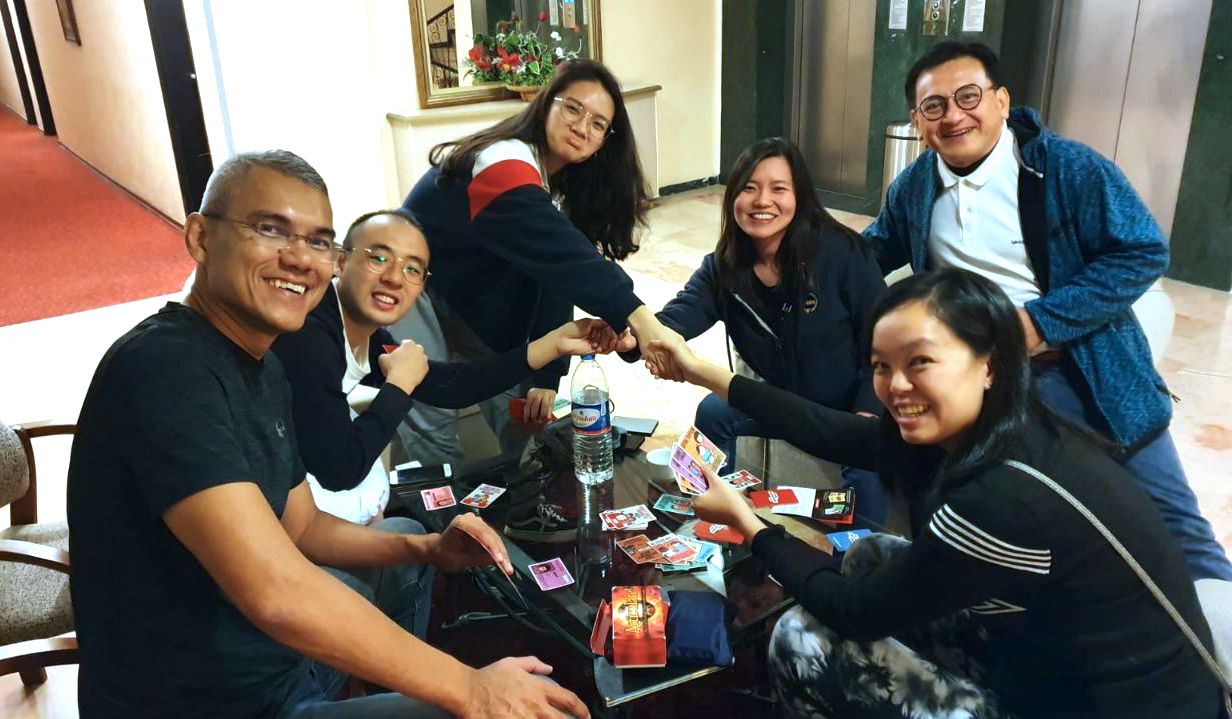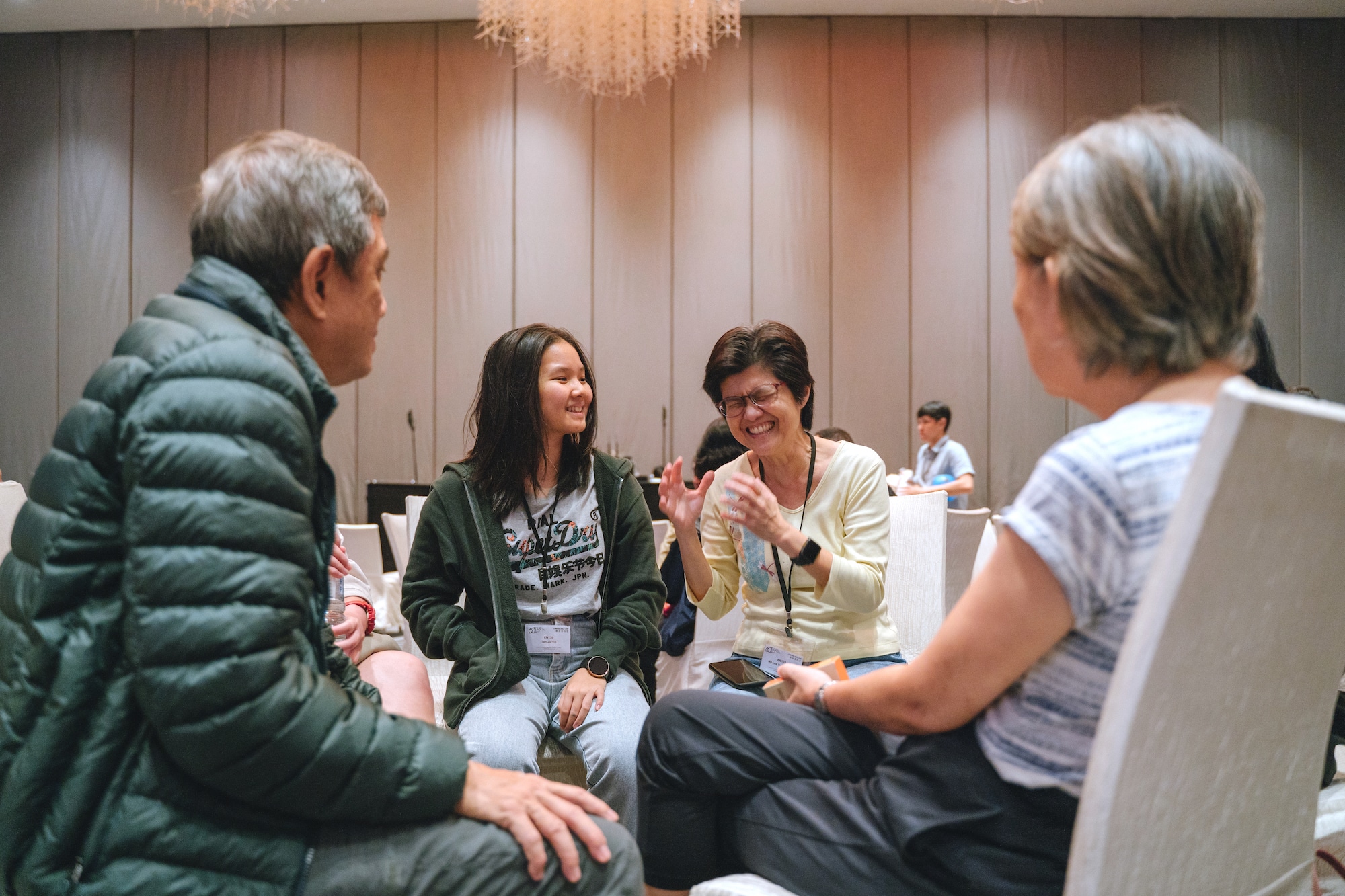Hello, you’re muted: A millenial speaks up about inter-generational dialogue
Tammy Leung // March 25, 2022, 10:55 am

Dennis (left) and Tammy (third from left) playing Singaporean Dream with their colleagues of various generations. Photo courtesy of Capelle Consulting.
“Older people speak way too slowly and always repeat themselves!”
“The young people don’t listen to me, and they talk to me like they know better.”
“Older people in church are so legalistic …”
These are sentiments I’ve heard within church walls. Perhaps you have heard or even said these yourself. The tension between people across different generations is a common struggle in our churches, and is also salient in the marketplace.
“Because I said so”
My colleague, Dennis, a learning consultant, once recounted a story he heard from an executive.
In that meeting, a Baby Boomer (generally classified as those born between 1946 and 1964) had just given a presentation. His colleague, a Millennial (born between 1982 and 1996) raised a question about the presentation. The Baby Boomer replied that, from past experience, this was what clients usually wanted.
“How many years ago was that?”
“35 years ago – before you were born.”
“Precisely, it’s such a dated experience, it may not even be relevant today,” said the Millenial. “The clients today don’t want something from 35 years ago!”
The Baby Boomer, who was the senior manager, felt offended and ended the conversation with: “Do it because I said so!”
It was likely that everyone wanted what was best for the situation, Dennis told me. But the lack of understanding and trust truncated the conversation.
Keeping the peace
In my research for the upcoming inter-generational dialogue, I decided to ask a Baby Boomer I respected what it was like for her working with Millennials. She enjoys serving alongside young adults in church and is actively mentoring several of them.
What struck me was what she shared about one of the difficulties she faced in relating to some of the younger people my age who often spoke to her with an “I-know-better” attitude.
Is the gulf between “old” and “young” is too wide to ever be bridged?
On occasion, that attitude translated into an arrogance and disregard which was hurtful because it made her feel looked down upon, she said.
As she spoke, I was embarrassed because I understood what she meant.
I’m a Millennial myself, and I can see how, in our passion to voice our opinions, we come across as dismissive of an older person’s experience.
Is the gulf between “old” and “young” too wide to ever be bridged?
Many ages, one Body
I was very appreciative when Dennis, the aforementioned colleague, initiated a conversation with me to find out more about, well, me.
He did not simply assume that I behaved and thought like a stereotypical Millennial.
He had read various articles about Gen Y and Gen Z in Singapore, and asked if these stereotypes resonated with me and my friends.
I am still new to the corporate world, right on the edge of Gen Y age range and almost a Gen Z-er, while Dennis sits squarely in the Gen X category.
That conversation left a vivid impression on me – that Dennis was genuinely interested in getting to know me.
It was also what inspired me to reach out and initiate a conversation on this topic with the Baby Boomer.
Tolerance is not love
In Ephesians 2:14-18, Paul addressed the divide between Jews and Gentiles by saying: “For He himself is our peace, who has made us both one and has broken down in his flesh the dividing wall of hostility by abolishing the law of commandments expressed in ordinances, that he might create in himself one new man in place of the two, so making peace, and might reconcile us both to God in one body through the cross, thereby killing hostility. And he came and preached peace to you who were far off and peace to those who were near. For through him we both have access in one Spirit to the Father.”
“I want the wisdom of the old and the passion of the young.”
If Jesus brought two divided groups together through the cross, why should there be any form of hostility or lines of division found in the church?
In John 13:35, Jesus said: “By this all people will know that you are my disciples, if you have love for one another.”
Jesus called us to love one another, not to merely tolerate each another.
When I was still a teenager, I heard Pastor Vincent Lun from Kingdom Community Church say this: “I want the wisdom of the old and the passion of the young.”
I remember being full of passion for the Lord, desiring the wisdom of those older than me in the church. Now in my mid-twenties, I find myself desiring the passion of those younger than me as well!
Imagine if we appreciated each generation and the unique knowledge and abilities they bring to the church to build her up – that is a church I personally want to be a part of.
Embracing intergenerational differences
How then, can we bridge this gulf, and not just tolerate, but embrace and love one another?
A practical first step is to initiate conversations with an attitude of counting others more significant than yourself.
I’m reminded of Philippians 2:1-8: “So if there is any encouragement in Christ, any comfort from love, any participation in the Spirit, any affection and sympathy, complete my joy by being of the same mind, having the same love, being in full accord and of one mind. Do nothing from selfish ambition or conceit, but in humility count others more significant than yourselves.
“Let each of you look not only to his own interests, but also to the interests of others. Have this mind among yourselves, which is yours in Christ Jesus, who, though he was in the form of God, did not count equality with God a thing to be grasped, but emptied himself, by taking the form of a servant, being born in the likeness of men. And being found in human form, he humbled himself by becoming obedient to the point of death, even death on a cross.
As Paul exhorts us, we ought to imitate Christ in his humility.
A practical first step is to initiate honest and open conversations with people different from you, with an attitude of counting others more significant than yourself.
Greater appreciation for others
Shortly after the conversation I had with Dennis, Covid-19 hit, and Dennis was eager to learn how to use online applications from me. He showed me how there is always something to learn from others, even those younger than you. I was inspired by Dennis’ humility, and thought, how wonderful it would be if all of us in church had conversations like this!
I started to practice initiating conversations with those older than me, starting with my parents at home. I was thankful that I did so. We now have a greater appreciation for one another’s point of view even in moments of disagreement. As a result, there is deeper trust amongst us.
This gives me confidence that I can connect meaningfully with those older than me and serve alongside them to build the church up.
My prayer is this: That people will find safe spaces for conversation with one another in the church, so that we may walk in greater love and unity.
East Asia School of Theology and Capelle Consulting are co-hosting a dialogue titled, “Hello, you’re muted: Hearing every voice in the inter-generational dialogue“.
On March 30, a panel of speakers aged 30 to over-60 will share the common pain points of inter-generational communication, and discuss ways of building a healthy culture for genuine dialogue across the generations. Register for the face-to-face event here: https://east.ac/intergen
Closing date for registration is March 27.
RELATED STORIES:
“Listen better”: World Vision International’s Andrew Morley on reaching millennials
(Dis)connected, idealistic, anxious: New survey helps decode the millennials in your life
We are an independent, non-profit organisation that relies on the generosity of our readers, such as yourself, to continue serving the kingdom. Every dollar donated goes directly back into our editorial coverage.
Would you consider partnering with us in our kingdom work by supporting us financially, either as a one-off donation, or a recurring pledge?
Support Salt&Light



